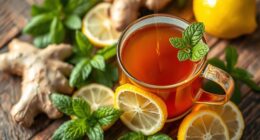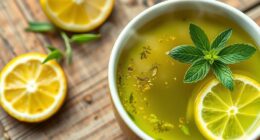Turmeric tea is a favored drink in India, enjoyed for hundreds of years for its medicinal advantages. It is more than just a comforting and tasty beverage; it is also thought to possess anti-inflammatory qualities that may aid in the relief of numerous health issues.
Making turmeric tea at home may seem intimidating, but it’s actually quite simple with the right ingredients and equipment. In this article, I will guide you through each step of making turmeric tea Indian-style.
So grab your teapot, put on some calming music, and let’s get started on creating a cup of golden goodness that will soothe your mind and body.
Key Takeaways
- Turmeric tea is a popular Indian beverage with many health benefits, including anti-inflammatory properties and immune system boosting.
- Measuring spices accurately and choosing the right brewing technique are crucial for consistent and delicious results.
- Adding black pepper enhances the absorption of curcumin in turmeric by up to 2000%.
- Experimenting with different spices and serving options can create a customized and enjoyable experience.
Gather Ingredients and Equipment
First, I gather the essential ingredients for making the perfect cup of turmeric tea. Turmeric, ginger, cinnamon, and black pepper are all must-haves in my kitchen when it comes to brewing this traditional Indian beverage.
To add a touch of sweetness and balance out the spices, I always make sure to have some honey on hand as well. With these ingredients ready to go, I’m prepared to make a delicious cup of turmeric tea anytime.
Turmeric
Turmeric adds a warm and comforting flavor to tea that’ll make you feel like you’re wrapped in a cozy blanket. Not only does it taste great, but it also has numerous health benefits. Here are three reasons why you should add turmeric to your tea:
-
Turmeric contains curcumin, which is known for its anti-inflammatory properties. This can help reduce inflammation in the body and alleviate pain.
-
Turmeric has been shown to boost the immune system, thanks to its antioxidant properties. It can help fight off infections and keep you healthy.
-
Some studies suggest that the compounds in turmeric may improve brain function, including memory and mood.
Now that we know about the benefits of turmeric, let’s move on to another important ingredient – ginger.
Ginger
You’re in for a treat with ginger, the next ingredient that will take your turmeric tea to the next level. Ginger is known for its many health benefits, such as reducing inflammation, aiding digestion, and boosting immunity. Adding ginger to your turmeric tea not only enhances the flavor but also increases its medicinal properties.
To make ginger tea, you’ll need fresh ginger root and water. Start by peeling and slicing about an inch of ginger root into thin pieces. Then bring 2 cups of water to a boil in a pot and add the ginger slices. Let it simmer on low heat for about 10 minutes before turning off the stove and allowing it to cool down slightly. Strain out the ginger slices before pouring the infused water into your cup of turmeric tea. Enjoy this deliciously soothing drink that’s both tasty and good for you!
Moving on to our next ingredient: cinnamon!
Cinnamon
Now, imagine yourself cozying up on a chilly evening with a comforting cup of tea infused with warm and fragrant cinnamon. Not only does it add a delicious taste to your turmeric tea Indian recipe, but cinnamon also offers numerous health benefits. It contains anti-inflammatory properties that can help relieve pain, reduce swelling, and fight infections.
Cinnamon is also known for its ability to lower blood sugar levels and improve insulin sensitivity. If you don’t have cinnamon available in your pantry or simply want to switch things up, there are several alternatives you can try. Cardamom is another spice commonly used in Indian cuisine that has a similar warming effect as cinnamon. Cloves and nutmeg are also great options if you enjoy their distinct flavors.
Experimenting with different spices can be a fun way to customize your turmeric tea recipe according to your preferences while still reaping the health benefits. As we move on to the next section about black pepper, it’s important to note that adding just a pinch of this spice can enhance the absorption of curcumin in turmeric by up to 2000%.
So let’s explore the benefits of black pepper together!
Black Pepper
Picture yourself biting into a juicy steak seasoned with freshly ground black pepper, not only enhancing the flavor but also aiding in the absorption of curcumin in turmeric by up to 2000%. Black pepper has been used for centuries in traditional medicine due to its numerous health benefits. It contains piperine, which is responsible for its characteristic taste and aroma, and has been shown to enhance digestion, improve brain function, and even have anti-inflammatory effects.
To truly reap the benefits of black pepper when making turmeric tea Indian style, it’s important to use freshly ground black pepper rather than pre-ground. This ensures that you are getting the full potency of the piperine. If you don’t have black pepper on hand or prefer an alternative spice, ginger can be used instead. Ginger also has anti-inflammatory properties and adds a nice kick of flavor to the tea.
As we move onto discussing honey as a natural sweetener for turmeric tea Indian style, keep in mind that both black pepper and ginger are great additions that not only enhance flavor but provide additional health benefits as well.
Honey
Let’s explore the benefits of adding honey to your turmeric beverage, shall we? Honey isn’t just a natural sweetener but also has numerous health benefits. It’s been used in home remedies for centuries due to its antibacterial and anti-inflammatory properties. When combined with turmeric, which is also known for its anti-inflammatory properties, it can make an even more potent mix that can help alleviate symptoms of arthritis, heartburn, and other inflammatory conditions.
Aside from being a healthier alternative to sugar or artificial sweeteners in your tea, there are many benefits of adding honey to turmeric tea. Honey can soothe sore throats and coughs by coating the throat with a protective layer that helps reduce irritation. It can also boost your immune system as it contains antioxidants that help fight against free radicals in the body.
So if you want to enjoy a warm cup of goodness while reaping all these benefits, let’s move on to the next step – brewing it in a teapot or saucepan!
Teapot or Saucepan
To brew this golden elixir, all you need is a teapot or saucepan. However, the choice of vessel can affect the brewing techniques and ultimately the taste of your turmeric tea.
Here are three things to keep in mind when choosing between a teapot and a saucepan:
-
Teapots are traditionally used for steeping tea leaves and are designed to infuse flavors evenly. If you prefer a more delicate flavor profile, opt for a ceramic or glass teapot.
-
On the other hand, if you like your turmeric tea strong and bold, consider using a stainless steel saucepan. The metal heats up faster than other materials, allowing the spices to release their full potential.
-
Whatever your choice may be, make sure that it’s clean and free from any residual flavors that might interfere with your turmeric tea’s taste.
Now that we have our vessel sorted out, let’s move on to preparing our ingredients.
Prepare the Ingredients
As I’m preparing to make turmeric tea Indian style, the first step is to peel and slice fresh ginger. This can be easily done with a sharp knife or peeler.
Next, I measure out the spices – turmeric, black pepper, and cinnamon – according to the recipe’s specifications.
Finally, I heat water in a pot on the stove until it reaches boiling point.
These simple preparations will ensure that my turmeric tea is perfectly flavored and delicious.
Peel and Slice Ginger
After rinsing the ginger thoroughly, peel and thinly slice it for a more intense flavor in your turmeric tea. Using fresh ginger is essential to achieving a rich, invigorating taste that complements the earthy notes of turmeric. Ginger has been used in Ayurvedic medicine for centuries due to its anti-inflammatory properties, making it an ideal ingredient to include in your daily cup of turmeric tea.
Not only does ginger add a zesty kick to your drink, but it also helps reduce inflammation and boost digestion. It contains compounds like gingerols and shogaols which have been shown to alleviate nausea, muscle pain, and soreness. Incorporating this spice into your turmeric tea can provide numerous health benefits while enhancing the overall flavor profile. Now that we have our sliced ginger ready, let’s move on to measuring out the spices needed for our delicious cup of Indian-style turmeric tea.
Measure Spices
Context:
Measure spices
Input:
Get ready to add some serious flavor to your cup by measuring out the perfect blend of spices for a satisfying sip that will warm both your body and soul. Spice measurement tips are crucial when making turmeric tea, as it’s vital to get the right balance of flavors.
Here are four essential tips for measuring spices accurately:
-
Use a measuring spoon: When measuring spices, it’s best to use a spoon specifically designed for that purpose. This way, you can ensure that you’re using just the right amount of spice.
-
Don’t overcrowd the spoon: Be careful not to overfill your measuring spoon with spice, as this can throw off the balance of flavors in your tea.
-
Level off the top: To get an accurate measurement, make sure to level off the top of your spoon with a knife or other flat tool.
-
Keep track of measurements: It’s important to keep track of how much spice you’re adding so that you can adjust future batches if needed.
Importance of measuring accurately cannot be overstated; it ensures consistent results every time and allows you to enjoy a perfectly balanced cup each time you brew turmeric tea at home.
Now that you’ve measured out all your spices correctly, let’s move on to heating water!
Heat Water
To heat up your water for making turmeric tea, there are different heating techniques you can use. For example, if you have a kettle or a pot on the stove, fill it with water and turn on the heat. Keep an eye on the temperature control and wait for it to come to a boil while you prepare your other ingredients.
It’s important to pay attention to the temperature of the water as it’ll affect the flavor and strength of your tea. Make sure not to overheat or burn your water, as this could lead to unpleasant flavors.
Once your water’s at the right temperature, move onto combining all of your ingredients in the teapot without delay.
Combine Ingredients in the Teapot
First, you’ll want to add one tablespoon of turmeric powder into your teapot along with 2 cups of water. It’s important to maintain the cleanliness of your teapot before starting this process because a clean teapot ensures that the flavor and aroma of the tea are not compromised. Drinking tea regularly has numerous health benefits, including boosting immunity and reducing stress levels.
Next, add a pinch of black pepper and ginger to the mixture in your teapot. These ingredients help enhance the taste and medicinal properties of turmeric. Black pepper contains piperine, which increases the absorption rate of curcumin, an active ingredient found in turmeric. Ginger adds a spicy kick to the tea while also providing anti-inflammatory and antioxidant benefits.
Turn on the stove and let the mixture come to a boil for about 5 minutes before removing it from heat. This will ensure that all ingredients are well combined in your turmeric tea Indian recipe. Strain and serve hot or cold, depending on your preference.
In conclusion, combining these ingredients in your teapot is an easy way to make delicious and healthy turmeric tea at home!
Strain and Serve
Now that all the ingredients have been combined in the teapot, it’s time to move on to the final step of making turmeric tea Indian style. The next step is straining and serving the tea. To do this properly, you need to be careful as there are different straining techniques and serving suggestions for turmeric tea.
To strain the tea, you can use a fine-mesh sieve or a cheesecloth. Place the sieve over a cup or mug and slowly pour the tea through it. This will remove any large pieces of ginger or other spices from your drink. If you prefer a smoother texture, use a cheesecloth instead of a sieve to filter out any small particles in your drink.
When it comes to serving turmeric tea, there are many ways to enjoy it. Some people like to add honey or sugar for sweetness while others prefer drinking it plain. You can also add lemon juice for an extra zing! One popular way of serving turmeric tea is with biscuits or cookies as an evening snack.
Moving forward, let’s explore some variations on this recipe that you can try at home.
Variations on the Recipe
There are many tasty variations of this recipe, such as adding a splash of coconut milk for a creamy twist. Other flavor additions that can enhance the taste include ginger, cinnamon, cardamom, or honey. These ingredients not only add depth to the flavor but also provide additional health benefits.
Serving suggestions for turmeric tea can vary depending on your personal preference. Some people prefer to drink it hot, while others like it cold. You could even try serving it over ice with a slice of lemon for some added zest.
Turmeric tea is perfect for any time of day and can be enjoyed alone or with a snack. Overall, there are endless possibilities when it comes to making turmeric tea Indian-style. Experimenting with different flavors and serving options can help you find the perfect combination for your taste buds.
In the next section, we will explore the incredible health benefits of turmeric tea and why you should make it a part of your daily routine!
Health Benefits of Turmeric Tea
You’ll be amazed at the incredible health benefits that come with drinking this golden elixir, from reducing inflammation and boosting brain function to improving heart health and aiding digestion. Turmeric tea has been used for centuries in India as a natural remedy for a variety of ailments, and it’s no wonder why. The active ingredient in turmeric, curcumin, is a powerful antioxidant and anti-inflammatory compound that can provide numerous health benefits.
According to research studies, turmeric tea can help improve brain function by increasing levels of brain-derived neurotrophic factor (BDNF), which is a growth hormone responsible for the formation of new neurons. Additionally, curcumin may also lower the risk of heart disease by improving endothelial function and reducing inflammation. This potent spice is also known to aid digestion by stimulating bile production in the liver.
Turmeric Tea Benefits: Beyond Health
But turmeric tea isn’t just good for your health; it’s also delicious and versatile! In addition to being used in traditional Indian dishes like curry, turmeric is now becoming increasingly popular in modern cuisine as well. From lattes to smoothies, there are countless ways you can incorporate this vibrant spice into your daily diet.
Culinary Uses | Turmeric Tea: Traditional vs. Modern Variations
So whether you’re sipping on a hot cup of traditional Indian-style turmeric tea or enjoying a refreshing iced version with honey and lemon, there’s no denying the many benefits that come with consuming this ancient healing drink. Now that we’ve covered all the amazing things turmeric tea can do for your body (and taste buds!), let’s move on to some tips for making the perfect cup of this golden elixir.
Tips for Making the Perfect Cup of Turmeric Tea
To create the perfect cup of this golden elixir, all you need is some hot water, a teaspoon of turmeric powder, a pinch of black pepper, and a dash of honey to sweeten the deal.
Did you know that adding black pepper to your turmeric tea can increase the absorption of curcumin by up to 2000%? This is because black pepper contains piperine which enhances the bioavailability of curcumin in our bodies.
Aside from its delicious taste, turmeric tea offers several health benefits. It has anti-inflammatory properties that can help reduce joint pain and inflammation.
Turmeric tea has also been shown to improve brain function and lower the risk of heart disease. Regular consumption of turmeric tea may even protect against certain types of cancer.
There are different ways to brew turmeric tea depending on your preferences. You can use fresh or dried turmeric roots instead of powder for a stronger flavor and added nutrients.
Some people like to add ginger or cinnamon for extra flavor and health benefits. Experiment with different brewing methods until you find your perfect cup!
Frequently Asked Questions
Is it safe to consume turmeric tea if I am on medication for a pre-existing medical condition?
As someone who takes medication for a pre-existing medical condition, I was concerned about the safety of consuming turmeric tea. After doing some research on turmeric tea interactions and dosage, I’ve found that it’s generally safe to consume in moderation.
However, it’s important to consult with your healthcare provider before adding any new supplements or herbal remedies to your routine, especially if you’re taking prescription medications. This is because turmeric may interact with certain medications and affect their effectiveness.
Additionally, it’s recommended to start with a low dose of turmeric tea and gradually increase as tolerated to avoid any potential side effects. Overall, while there are potential benefits of drinking turmeric tea, it’s important to approach its use cautiously and seek medical advice before incorporating it into your routine.
Can I substitute fresh turmeric with turmeric powder in the recipe?
Yes, you can definitely substitute fresh turmeric with turmeric powder in the recipe. However, keep in mind that the flavor and potency of the tea may differ slightly. Fresh turmeric has a stronger, more pungent flavor compared to its powdered counterpart.
There are many variations of turmeric tea that you can try out depending on your taste preferences and health goals. Some popular variations include adding ginger or honey for sweetness or incorporating black pepper to enhance the absorption of curcumin (the active ingredient in turmeric).
Remember to consult with your healthcare provider before incorporating any new dietary changes especially if you have a pre-existing medical condition and are taking medication.
How long should I steep the tea for to get the maximum flavor and health benefits?
When it comes to steeping turmeric tea, the duration is crucial to achieving the maximum flavor intensity and health benefits. Based on my experience, I recommend steeping the tea for at least 10-15 minutes to extract all of the beneficial compounds present in turmeric. However, be cautious not to over-steep as it may result in a bitter taste.
As for dosage guidelines, it’s generally recommended to consume up to 3 grams of turmeric per day. But if you’re new to turmeric consumption or have any underlying medical conditions, it’s best to consult with your doctor before incorporating it into your diet.
Overall, steeping duration plays a vital role in enhancing both the flavor and health properties of turmeric tea.
Can I add honey or any other sweetener to the tea to enhance its taste?
Yes, you can definitely enhance the taste of turmeric tea by adding honey or other sweeteners. If you’re looking for healthier alternatives to honey, try using stevia or maple syrup instead. Pairing turmeric with spices such as ginger, cinnamon, cardamom, and black pepper can also complement its flavor. Adding a little milk or coconut oil can help bring out the flavors in the tea. Overall, experimenting with different sweeteners and spice combinations is a great way to find your perfect cup of turmeric tea.
Can I store the leftover tea for later consumption and if yes, how long will it last?
Yes, I can definitely store the leftover turmeric tea for later consumption. However, it’s important to keep in mind that the shelf life of the tea may vary depending on how it was prepared and stored.
Generally speaking, if the tea has been stored properly in an airtight container and refrigerated promptly after brewing, it should last for up to 2-3 days. If left at room temperature for too long or not stored properly, the tea may spoil faster and develop a sour taste.
To ensure that my leftover turmeric tea stays fresh for as long as possible, I always make sure to transfer it into a clean glass jar with a tight-fitting lid before storing it in the fridge.
Conclusion
In conclusion, making turmeric tea is a simple and rewarding process. It not only offers a unique taste experience but also numerous health benefits, making it an ideal addition to your daily routine. Turmeric has been used for centuries in traditional Indian medicine as a natural remedy for various ailments, from reducing inflammation to boosting immunity.
Did you know that India produces 80% of the world’s turmeric? This fascinating statistic speaks volumes about the cultural significance of this spice in Indian cuisine and medicine. It also highlights the importance of supporting ethical and sustainable practices when purchasing turmeric products.
To truly appreciate the full potential of this golden elixir, experiment with different variations such as adding honey or ginger to enhance its flavor profile. Remember to use high-quality ingredients and follow our tips for making the perfect cup every time.
So why not brew yourself a cup of homemade turmeric tea today and reap its many benefits? Your body will thank you!










